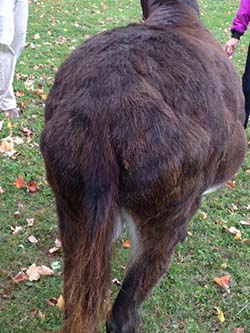Opinion: It’s True! I Read
It on the Internet
This newsletter has sought to reveal some of the myths and unfounded treatments for allergic pets that are prevalent on the internet.
As the Marketing Director for Animal Dermatology Clinic, I find interesting to read what pet owners and some businesses discuss in treating an allergic pet. Sadly, many pet owners believe that because they read it on the internet, then it must be true.
Google has a great feature that whenever a selected word or phrase appears anywhere in the internet (“itchy dog”, in this case), a link to the site is provided to me.
A recent link that was sent to me is an internet business selling remedies for pet ailments which included a guideline in the steps to treating an allergic pet. From their website:
“…Some dog allergies will require the expertise of a veterinarian and possibly a dermatologist also if your vet determines that your dog is not responding to any treatments. It is not easy to find a dermatologist who will also treat animals, so be sure your veterinarian recommends a doctor who will see your pet either at the vet’s office or in your home. For health reasons, many doctors will not allow pets in their offices.”
The recommendation of seeing a veterinarian is encouraging. Mentioning a dermatologist for an allergic dog? Awesome! But reading a little closer the article states that “it is not easy to find a dermatologist who will also treat animals…” What? This article is asking that you seek out a medical doctor specializing in treating people to also examine your allergic dog.
A dermatologist and veterinary dermatologist are skilled professionals that have completely separate areas of responsibility: people vs animals. Further, it would be unethical and unlawful for any human dermatologist to examine a pet under the guise of veterinary treatment, unless of course that doctor was actively licensed for both of those professions.
I contacted this “business” many months ago about the erroneous information that was posted and it is still active on their site today. It’s hard to imagine that pet owners would attempt to take their allergic dog to their dermatologist who treated their son for acne: “He did a good job on Junior, maybe he can fix Fido.” It’s equally hard to imagine that a human dermatologist would violate the Veterinary Practice Act of their state in attempting to do so!
So, just because you read it on the internet…
~Don Fruta, Marketing Director
Tis’ the Season to Support a Shelter

Each day, dogs and cats are euthanized because their “time was up” at a shelter. Responsible pet ownership and pet population control is vital to reduce and eliminate the practice of destroying unwanted and abandoned pets. Until then, it becomes a waiting game for an animal to be selected by their new person.
Despite the eagerness of people who want pets, many will not consider a rescue.
Page 4 of print verison of Derm Digest lists just a few of the no-kill shelters and rescues in your area that are working hard to find forever homes for unwanted or abandoned pets.
Many shelter workers are unpaid volunteers and the organizations run on razor thin budgets so your donation to an animal shelter is always welcome. Contact a shelter to make a gift of money, supplies or your time. Should you desire a new pet, visit your local shelter and find a new cat or dog that will be forever grateful.
(Download the PDF to see page 4. Adobe Reader required)



